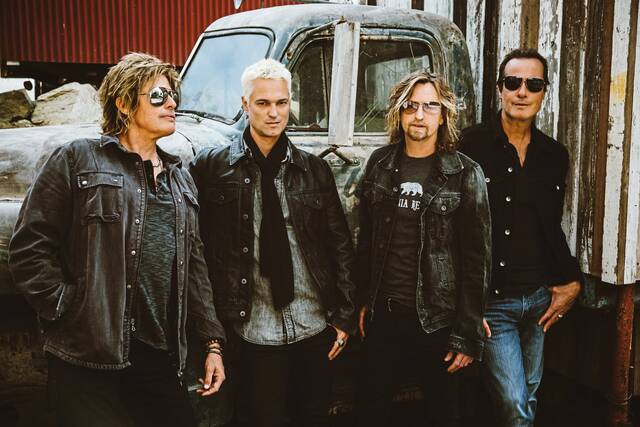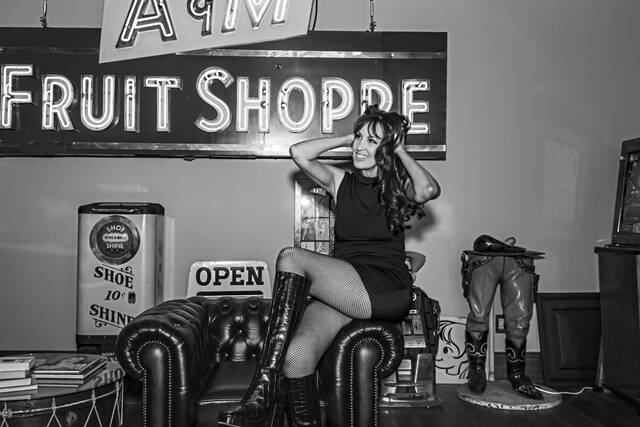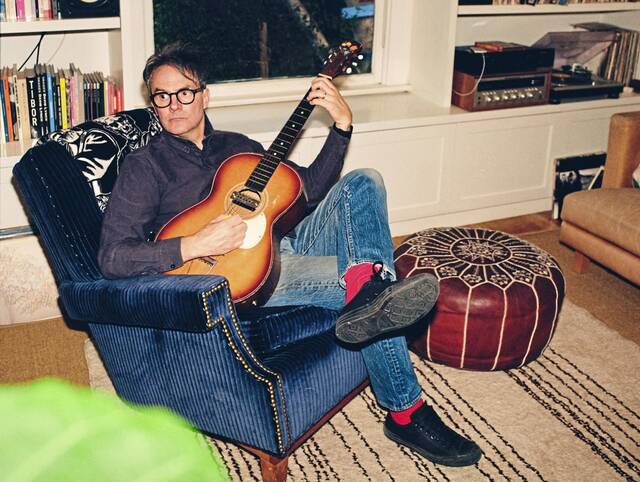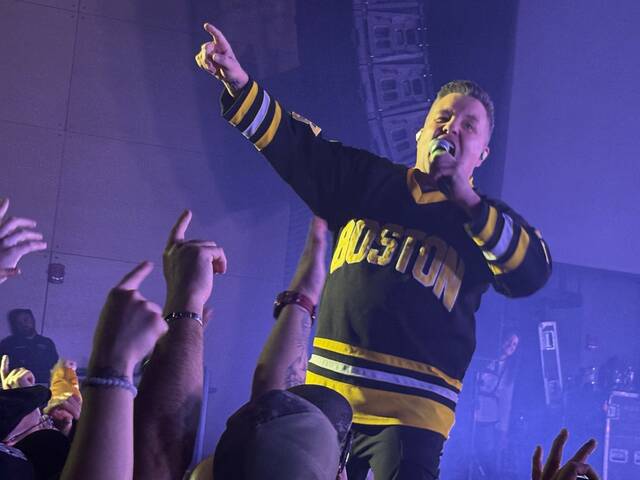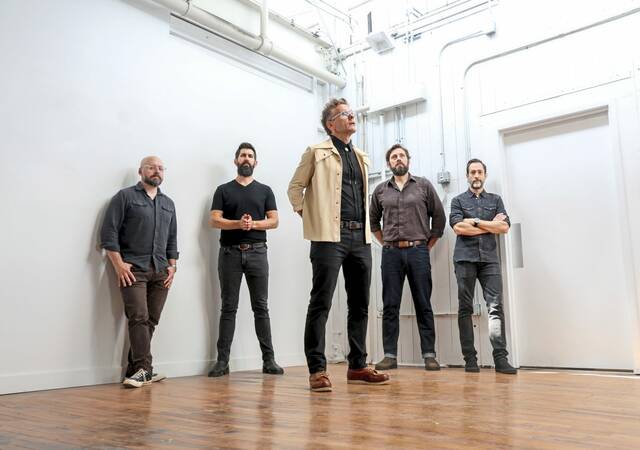It’s been almost eight years since Jeff Gutt became Stone Temple Pilots’ singer, and he still finds it hard to believe sometimes.
“I don’t think it’s sunk in yet,” Gutt said with a laugh. “Every now and then, I’ve got to pinch myself, usually when we’re about to go on stage and I’m like, wow, I’m really in Stone Temple Pilots. When I was younger, if you would have told me I was gonna be in this band, I would have laughed at you. Being from a small town in Michigan, it’s like people from where I’m from don’t usually get out of here.”
In 2017, the Marine City, Mich., native took over on vocals for the alternative rockers, who were originally fronted by Scott Weiland, who left the group in 2013 and died in 2015. (Linkin Park’s Chester Bennington also stepped in on vocals from 2013-15.)
Replacement singers often have a stigma surrounding them, but Gutt took an optimistic approach as he prepared to tackle chart-topping songs like “Interstate Love Song,” “Plush” and “Big Empty,” just to name a few.
”There’s really nothing I can do about it, so I try to concentrate on the things that I can control and go from there. I knew going into it, being that I was a fan of them, that I would have been the guy in the back with my arms crossed, tapping my finger, going hmm,” he said with a laugh. “I knew what I was getting myself into, but at the same time, I felt like they deserved the chance to continue and to grow and to do whatever they wanted to do with their careers. And then if they wanted to keep Stone Temple Pilots going, then that was going to be there for them, and that’s kind of the way I looked at it.”
Gutt and the three original members of Stone Temple Pilots — guitarist Dean DeLeo, bassist Robert DeLeo and drummer Eric Kretz — are still going strong, with a show Saturday at the Hollywood Casino at the Meadows in Washington.
In a call Monday from Michigan, Gutt discussed international crowds, playing STP songs while he was younger, filling big shoes and more:
It looks like the band’s been all over the world this year. What’s been your favorite experience outside the U.S.?
Oh man, that’s a tough one. You gotta love Australia because it’s so beautiful. But the crowds in South America are just insane. They just love rock music to the core. They bleed it, so it’s like there’s no crowds like South America.
Every time you see a video from down there, it just seems like it’s nuts and they’re really into it.
Yeah, they’re nuts. They go nuts. It’s the best feeling in the world. (laughs)
Are you your hometown’s most famous person/alumni?
Well, actually, I was in a band — my first band ever when I was a teenager — the guitar player (Steve Mazur) in that band joined Our Lady Peace back in like 2000. … (It’s) weird because we used to play Our Lady Peace songs and Stone Temple Pilots songs, which really prepared me because we did “Trippin’ on a Hole in a Paper Heart,” which means that, being the most wordy song, it was already ingrained in my memory, so it was like, all right, I’m already trained for it.
When you were hired for the band, they didn’t announce it for a year. Was it hard to keep a secret for that time?
No, actually, it wasn’t. That was kind of like my favorite part, because it was like I had this superpower that was a secret and walking into places and hearing Stone Temple Pilots come on, just having a little smile on my face. I kind of enjoyed that actually, having a secret that no one knew. Well, obviously, being in the band is my favorite part, but that was a special time, for sure. It was unique, and I don’t think a lot of people get to really experience something like that.
You mentioned playing (“Trippin’ on a Hole in a Paper Heart”), but had you been a fan of the band in your teenage years, before you started playing them?
Yeah, absolutely. Actually the whole ’90s movement was huge for me, because I was always a guitar player, and I never really wanted to be the center-of-attention singer guy. I just wanted to be the guy on the side that wrote the songs and sang the backups. But no one could ever sing, so I ended up just having to do it. And then, when the ’90s came, it was like, finally, I felt like that was more my vein of frontman, as opposed to the ’80s spandex, dressing up like a professional wrestler type of deal. That was just more my style, so it kind of fit me more than I had to fit into it.
Did it take some time to be comfortable up there at the center of stage?
Yeah, definitely because I’m not the get-in-your-face, party-type of guy. I’m more of a come to my world type of person. (laughs)
With Stone Temple Pilots, what about their songs stand out to you today?
I think it was the progression of the records and coming out of “Core” — which I loved “Core” — and then going into something like “Purple,” it was like there was a complete departure. But yet it still had the same vein and you could tell it was the same band, especially with Scott and his ability to change his voice from song to song and the characters he would sing through. The influences he had are a lot of the same ones that I had, like Karen Carpenter and Gordon Lightfoot. A lot of the older stuff that I grew up listening to when I was younger, I found out it was the same stuff he listened to when he was younger. So, yeah, there’s a lot of similarities there that were happy accidents.
Related
• Billy Corgan and the Machines of God dive deep into Smashing Pumpkins' catalog in Pittsburgh show• Pittsburgh's The Cheats release new album 'Old Rats on a New Ship'
• 2025 Pittsburgh area concert calendar
How did you approach filling the big shoes that Scott left behind?
Wear two pairs of socks. (laughs) But no, it was just natural. It was natural for me, it was a natural fit because it’s kind of in my wheelhouse. It’s kind of what I’ve always done and what I’ve always aspired to do is things like that. Obviously, all those bands at the time had influence over me, but Stone Temple Pilots was definitely one of them. And they were the ones that were the most unique to me because of the way they progressed and the way they changed and the way they took chances and they took risks and they didn’t play it safe. So I really had an appreciation for that. So, coming into it, knowing that, in the back of my mind, made it a lot easier.
What’s been the best thing for you about joining this band?
When I was in my own band, I had to micromanage every detail of everything. And now being in Stone Temple Pilots, I can walk into the room and they’re like, ‘Hey, listen to this.’ I put on the headphones and yeah, OK, I’m the first person that hears this and I get to decide what’s going to happen with it, kind of like where it’s going to go and what the melodies are. Sometimes they have melodies, sometimes they don’t, and I just come up with whatever I come up with. It’s a more freeing atmosphere than being bogged down by the minutiae of all the details of every single aspect of everything. So it’s a very freeing feeling.
The band definitely has some hits that they have to play every night, but are there any deeper cuts that you’d like to see the band like work into the set?
Oh man, we do that from time to time. Right now we’re doing “Kitchenware & Candybars” and that one’s just amazing, especially since we do it later in the set. Because after I sing full voice and then going down to something so small and controlled, it can be tricky. But I love a challenge. People normally wouldn’t think that that would be difficult, but when you’re singing high and loud and then you have to get small and soft and very intimate, it can be tricky on the throat.


